- Home
- Elif Shafak
The Architect's Apprentice Page 21
The Architect's Apprentice Read online
Page 21
The guards shoved Jahan through a dingy, damp corridor. They went down a flight of stairs and entered a passageway so narrow that they had to proceed single file. Jahan could not help but notice the cracks on a wall where slimy, green moss had gathered. They descended to another floor, then another. The stench got thicker, the gloom heavier. He stepped upon something that he knew instinctively had once been alive.
They were in the belly of the tower. Save for a few sconces, it was so dark that if Jahan hadn’t known it was morning when he had been brought here, he would have believed night had fallen. There were cells left and right, carved out like missing teeth in a mouth. Then he saw them. Hollow-cheeked, raw-boned, short and tall, young and old. Some were watching him, their foreheads resting against the iron bars. Others ignored him, turning their backs. Still others were lying on coarse mats. Every now and then, Jahan caught sight of a bony arm reaching out for a ladle of water, a haggard face peeking out from the shadows, turds piled beside buckets filled to the brim with excrement.
One inmate cried out in a gravelly whisper, and when Jahan turned to hear what he was saying, he spat on his face. Unable to move his hands, Jahan tried to wipe off the phlegm with his shoulder. The prisoner laughed. Even when his lips had stopped moving, the laughter continued – low, creepy. In that moment Jahan felt like the tower was jeering at him. His knees gave way. True, he was a thief, but not like them. These people were bandits, murderers, rapists, marauders and brigands. He should not have been among them. Bitterness rose in his throat like bile, almost choking him.
‘Walk!’ barked a guard.
Ahead of them something squeaked. The guard shone his torch on it. A bat. Jahan wondered how it had got in. There was no time to ponder. Opening a rusty gate, the guards pushed Jahan into an empty dungeon.
‘Here’s your throne, your Highness!’
Jahan waited for his eyes to get used to the dark. There were slivers of light from openings high above, no more than half a dozen and each no larger than a coin. This was where fresh air entered, if it did at all. He saw stone walls, a dirt floor, a threadbare mat and two wooden buckets – one of which was caked with faeces, and the other filled with water in which a few dead insects floated.
‘Hey, why didn’t you bring him here?’ someone yelled from across the hall.
The man raved about what he would do to Jahan. At each lecherous remark his mates hooted with laughter. They went on in this vein for a while, he shouting obscenities and smacking his lips, the others jeering. Soon they were singing a song – banging, clapping, stomping their feet. Such was the noise Jahan could not help but steal a glance at their cell, which, in contrast to his, was bright with candles.
One of the inmates – a lad with curly hair, almond eyes, dimpled cheeks – began to dance while the others whistled and cheered. With a slow sway, he pulled his shirt up, exposing his bellybutton, on which shone a tiny pearl. Underneath, a word was tattooed in letters large and legible enough for Jahan to make it out – Beloved.
‘Come on, Kaymak!’
‘Shake that sweet rump!’
Emboldened, Kaymak began to joggle his body. The harder he jerked and jiggled the more ribald the taunting became. The other inmates – there were four of them – cackled, though Jahan noticed they were frightened of the bully. What struck him was that these prisoners were unchained, unlike himself and pretty much everyone else whom he had passed along the way. How they had obtained this privilege, Jahan could not possibly imagine.
As Jahan was observing the lad, the bully had been observing him. Suddenly, he grabbed Kaymak from behind and thrust himself forward as if mounting him. His cronies roared. Blushing, Kaymak broke into a nervous smile. The ruckus must have been heard from everywhere but the guards had disappeared.
The bully produced a blade from out of his boot. He licked its cold, sharp end and held it against Kaymak’s throat. The lad’s Adam’s apple bobbed up and down, but he continued swinging. For a while the three were locked in a world of their own – the bully, the dancer, the blade.
The bully stepped aside, rolled up his sleeve. His left arm was covered in bruises and lacerations: some of the latter had scabbed over, while others seemed to be recent. With one quick move he slashed his flesh from wrist to elbow. Trickles of blood dropped on to the floor, which, Jahan only now realized, was flecked with black stains. Try as he might to appear indifferent, Jahan went limp. It occurred to him that he could kill this man.
That was when a voice penetrated the air. ‘Enough, you lot!’
The command, unreal as it sounded, echoed off the walls and muted the commotion at once. Jahan glanced to his right, towards the cell at the end of the corridor. At first he saw nothing. Then, slowly, out of the dusk, strode a familiar face. Balaban.
The bully gave a grunt. ‘The chaps were havin’ a bit of fun.’
‘Yeah? Tell ’em they’re giving me a headache.’
The bully gestured to his men. They retreated to the corners of their cell, including the lad, who reluctantly strutted away.
‘One more thing,’ called Balaban.
‘Hmmm?’
‘Stop cutting yourself, Abdullah. Don’t want to see blood everywhere.’
‘It was for the newbie,’ Abdullah said, sounding offended that his gore wasn’t appreciated.
‘Well, the ceremony is over,’ Balaban said. He approached the iron bars of his cell, only now glancing at Jahan. ‘What do you know! It’s the Indian guy.’
There were five Gypsies with him in his dungeon, loyal to the core. One by one they bobbed their heads and saluted Jahan.
‘How did you end up in this shithole?’ asked Balaban.
‘I have upset the Grand Vizier,’ said Jahan. ‘And you?’
‘Me? I’ve done nothing. Just gave a kadi a little tickle!’
Balaban had been arrested for stealing a coach that belonged to a judge. This man had thrown Balaban’s distant cousin into gaol and sent his great-uncle to the gallows-tree. Determined to avenge his family, Balaban and his mates had purloined the kadi’s jewels and kaftans, cooked the peacocks in his courtyard, kidnapped his fourth wife and set his stables on fire. Only when they set their sights on his brand-new coach – brought from Frangistan and previously owned by a seigneur – had they been caught.
In the dungeons of the Fortress of Seven Towers, Balaban was king. Amid the misery and wretchedness he had made an oasis – soft, silk cushions, a brazier for warmth, a brass pot to brew coffee, the carved oak chair that was his throne. The inmates either revered or avoided him, careful not to tread on his toes. For they all had loved ones outside – parents, wives, children. Even the fiercest prisoner was aware that, should he wrong Balaban, a member of the Gypsy kith and kin would strike back. For Balaban was the head of an enormous tribe, the size of which was a mystery even to him. But this wasn’t the only reason why he was held in the highest regard. Inmates and guards dreaded the Romany jinx, which, if cast on a full moon, could be purged only in seven generations’ time. Even after the culprit died, his grandchildren would suffer the consequences.
All this Jahan learned fast. He suspected that behind the legends about Balaban was none other than Balaban himself. Next to Sinan, he was the most intelligent man Jahan had met. But whereas his master’s wit was a calm, bottomless lake, Balaban’s was a turbulent river, slopping and sloshing over, too tempestuous to follow a course.
At night Jahan wrapped around himself a flimsy, moth-eaten blanket that reeked of every soul who had used it. Often it got so chilly his teeth chattered; the clatter reminding him of chisels chipping away at stone. Through the cracks in the walls the wind howled, insects scuttled, rats scurried. The thought of one of these creatures entering his ear or chewing up his nose was so terrifying he slept in fits and starts, awaiting the break of dawn, his head aching from clenching his jaw. He missed Chota. He longed to see Mihrimah once more, hear her satin voice. His previous life now seemed like a tale he vaguely knew because he had once heard it
from someone else.
The guards were spiteful, the weeks painfully slow. Time became a winding staircase that reached nowhere. Loneliness, he could cope with; desertion he could not. Try as he might to find excuses he could not comprehend why Sinan had not even sent him a message. In the early days, whenever he heard footsteps down the corridor, he had expected the guards to release him. Not any more. Surely he was forgotten. He imagined them – Yusuf, Nikola, Davud and his master – working as usual, unaffected by his absence. He saw Mihrimah with her handmaidens, contemplating her face in a Venetian mirror, silently mourning, silently but not deeply. He thought about Chota and the animal-tamers in the palace, each in his own world. Resentment and rage infested his soul, multiplying faster than the lice crawling on his head.
Once a day they were given a piece of mouldy bread and a gruel with bits of gristle, none of which Jahan could cram down without retching. Hunger did strange things, he found out. No matter what time of the day, he dreamed of food – all kinds of provisions. He talked to himself, arguing with those who had hurt him in the past. Captain Gareth, Carnation Kamil Agha, the bear-tamer Mirka … Awake or asleep, he quarrelled with each of them. In his cell Abdullah watched him with a wry smile, as though to say they were now beginning to look alike.
A month into this, the guards brought in a boy with a face too pretty for his own good – a pilferer, as it turned out. He could barely walk, having received a hundred strokes on each foot. Afterwards he had duly kissed the hands of his punisher, thanking him for teaching him the way of righteousness. He was asked to pay the man who had flogged him in return for having tired him so. The boy had not a single asper to his name. He was beaten again, and sent to the Fortress of Seven Towers.
There was plenty of space in Jahan’s cell, but the boy was put in the one opposite. It didn’t take Abdullah long to start harassing him. The boy resisted fiercely. Every so often Jahan heard his reedy voice, infused with fear. Dark circles appeared under his eyes. Jahan suspected he could not lay his head down to rest for having always to be alert.
One morning, having only just passed out at dawn, Jahan awoke to muffled sounds. He noticed Kaymak first, plucking his eyebrows in one corner of his cell. The others were playing a game of dice, yelling and swearing. Then he saw them: Abdullah had propped his blade against the boy’s throat, forcing him to be quiet as he pulled his breeches down. Everyone was feigning ignorance.
Jahan ran to the bars and shouted at the top of his voice, ‘Balaban!’
Not a sound. ‘Balaban, hey!’
‘What?’ came a grumpy response. ‘Why are you braying like a horse?’
‘The boy is in a bad way!’
‘So?’
‘Help him!’
‘If I were to help every witless lad, I wouldn’t have time to shit.’
‘He’s only a child.’
‘So? If you’re a mallet, knock; if you’re a peg, bear the knocking.’
Jahan bellowed, ‘Damn you! Do something or else …’
The sentence dangled in the air, unfinished. Jahan hesitated, swallowing hard. With what could he possibly threaten him? He added, wearily, ‘It means you are no different than Abdullah.’
‘Never claimed I was,’ Balaban replied.
Abdullah chuckled. His hands fondling the boy’s haunches, he said, ‘You want to save him? Come, swap places!’
An awkward silence descended as Jahan considered what to do. Balaban, Kaymak, the boy, the inmates down the corridor – it felt as though everyone was waiting for his response. Jahan felt a burning shame and yet also the need to say something remarkable. ‘I’ve an elephant. He’s trampled many a man. When I get out of here, I swear he’ll kill you.’
‘What is an elephant?’ said Abdullah, sounding confused.
‘A wild beast. Larger than a house.’
Abdullah scoffed. ‘Did you swallow hashish, eh? Where did you find it?’
‘It’s true. Elephants are the biggest animals on earth. Mine will make a hash of you.’
‘That’s a lie!’ Abdullah said.
‘You better believe him,’ Balaban broke in. ‘Got an elephant myself. His elephant and mine are husband and wife. Clever animals. Smarter than you, for sure. They could squash you like a toad.’
Now that Balaban had sided with Jahan, Abdullah took the threat more seriously. Frowning, he asked, ‘What do they eat?’
‘Human flesh,’ Jahan said.
‘Liar!’ Abdullah said, though less certain this time.
In that fleeting moment the boy freed himself from Abdullah’s embrace and ran to the other side of the cell. He did not speak a word all day. Fortunately for him, he would soon be released. Glad as Jahan was to see him safe, he could not rise from his own mat to bid him farewell. He felt tired. And thirsty. And cold. Time had come to a stop for him. In fits of delirium, he kissed Mihrimah, laughed with Sinan, walked beside Nikola, Yusuf and Davud. He saw a few ghuls and ifrits* as well. One of them was quite pesky, insisting that he swallow a brew.
‘I don’t want anything from an ifrit,’ Jahan said.
‘I’m no ifrit, you idiot.’
Jahan forced his eyes open. ‘Balaban?’
‘Yeah, come on, drink! You’re burning up.’ Holding the cup in one hand, Balaban helped Jahan to sit up and rest his back against the wall.
‘What are you doing here?’
‘Looking after you.’
‘How did you get in?’
‘I’ve the keys to every cell in this corridor.’
‘You what?’
‘Shh, we’ll talk about that later. Say, do you have a wife?’
‘Nay.’
‘How about a lover, eh? Big bosom, warm arse. Imagine she made a sherbet for you. Take a sip, don’t break her heart.’
For the life of him Jahan could not think of Mihrimah preparing for him – or for anyone else – sherbet. Closing his eyes, he muttered, ‘I don’t want –’
‘Trust me and drink this.’
‘Trust you? You didn’t help the boy.’
Balaban sighed. ‘That boy was not one of ours. He had not sworn allegiance. If I protect everyone, how will I keep my own people loyal? I’ve enough to worry about. You know what they say, where there are two Gypsies, there are three opinions.’
‘So you only protect yours?’
‘Yes, only family!’
‘Damn your family!’
‘Watch what you say, brother. Why should I help every rogue in this hole?’
‘Why are you helping me? I was wrong. You’re worse than Abdullah.’
‘You talk to me like that and I’ll rip out your tongue.’
‘Do it,’ said Jahan. ‘Doesn’t matter any more.’
‘Unless … you are family. Then you can talk to me like that.’
Seized by a fit, Jahan coughed, his shoulders convulsing. When he found his voice again, he asked, ‘What are you talking about?’
‘Let’s make a deal. You drink this, get well. I throw a feast come this spring. I make you an honorary Romany. I don’t have to chop out your tongue.’
A ripple of laughter came from Jahan’s lips. Balaban glowered at him. ‘You think it’s funny?’
‘Nay, it’s not that,’ Jahan said. ‘I’d be honoured. It’s just … I don’t think I’ll get out of here.’
Abdullah, having eavesdropped on them from his cell, yelled, ‘Let him rot!’
‘Shut your trap!’ Balaban shouted. Lowering his voice, he said to Jahan, ‘You drink this, I make you a Gypsy. This is an excellent brew, Daki dey’s* recipe.’
In his state it didn’t occur to Jahan to ask who that was. As soon as he took a sip, he spat it out. ‘Ughh. What’s this? Disgusting.’
Balaban sighed. With one brisk move, he pulled Jahan’s head back, pressed it against his shoulder and poured the liquid down his throat. Spilling and gasping and coughing and retching, Jahan nevertheless swallowed half of it.
‘Good,’ Balaban said. Taking out a handkerchief from in
side his waistcoat, he tied it around Jahan’s head. ‘This spring, you become family.’
Whether it was the magic of the brew, which Jahan consumed three times a day for the next week, or sheer luck, of which he didn’t think he had much, he overcame the illness. He even found the strength to start designing again.
In the Fortress of Seven Towers, if hope was a scarcity, shit was a superfluity. The buckets were seldom emptied and Jahan’s was no exception. A pile of excrement had accumulated in one corner. In days of old, architects had scratched their designs into plaster tracing-floors. Jahan drew on his floor with a twig and used shit as ink.
First he designed a caravanserai. Wiped it off, tried a manor house, one worthy of Mihrimah. His masterpiece was a prison building. Not vertical but horizontal. Through large openings in the ceiling it would get lots of light and fresh air. In his prison he would never place the young convicts with the old. Nor would he keep anyone in chains. The convicts could work in ateliers, learning carpentry or masonry. There would be workshops adjacent to the master building. Until this day Jahan had enjoyed designing buildings but had never really given any thought to those who would be using them and to how they would feel. Now it was different. He cared about people as much as he did about buildings.
‘What are you doing?’ Balaban asked the next time he came to check on him.
‘Drawing an alms house. This part is the kitchen. And here is the library. If every wise man in the city would teach there for a day, imagine how even the destitute could thrive.’
‘Poor thing, you’ve gone mad,’ said Balaban; but he couldn’t help asking, ‘How about the other?’
‘That’s a hospital,’ said Jahan, pointing at the second drawing. ‘For people madder than me. The building will contain them but without incarcerating them.’
‘Well, do your drawings outside. I’ve got news. The Grand Vizier pardoned you.’
‘How do you know?’
‘I have family in the palace.’

 Black Milk: On Writing, Motherhood, and the Harem Within
Black Milk: On Writing, Motherhood, and the Harem Within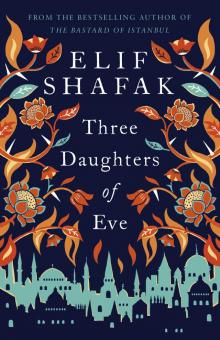 Three Daughters of Eve
Three Daughters of Eve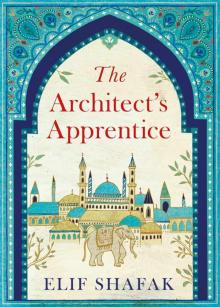 The Architect's Apprentice
The Architect's Apprentice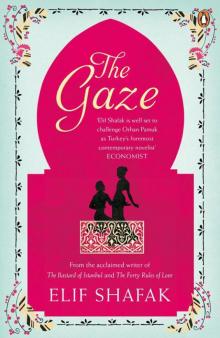 The Gaze
The Gaze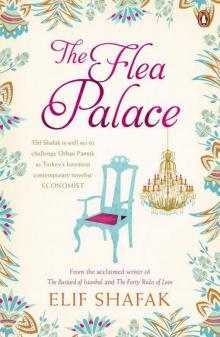 The Flea Palace
The Flea Palace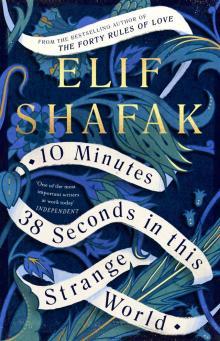 10 Minutes 38 Seconds in this Strange World
10 Minutes 38 Seconds in this Strange World The Forty Rules of Love
The Forty Rules of Love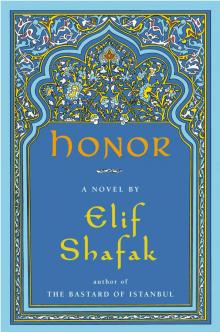 Honor
Honor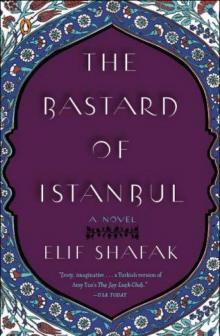 The Bastard of Istanbul
The Bastard of Istanbul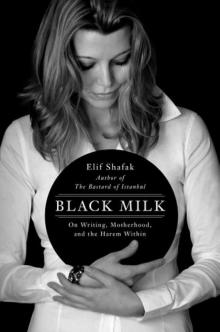 Black Milk
Black Milk The Happiness of Blond People (Penguin Specials)
The Happiness of Blond People (Penguin Specials)